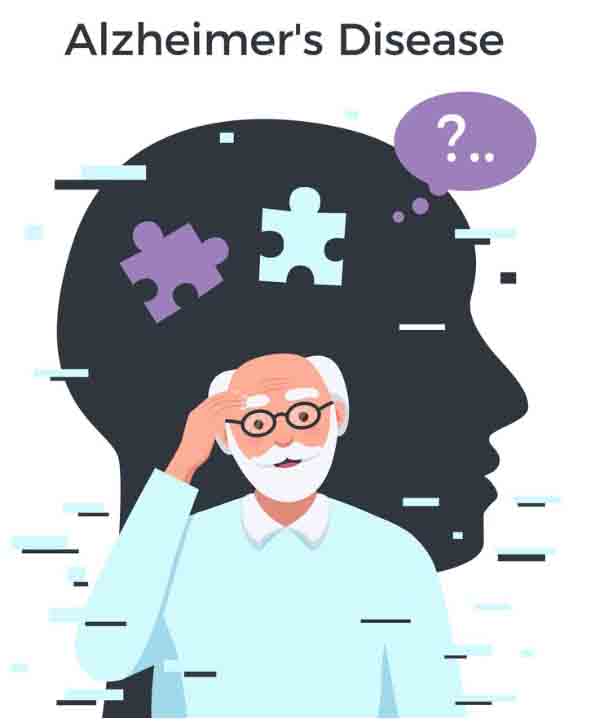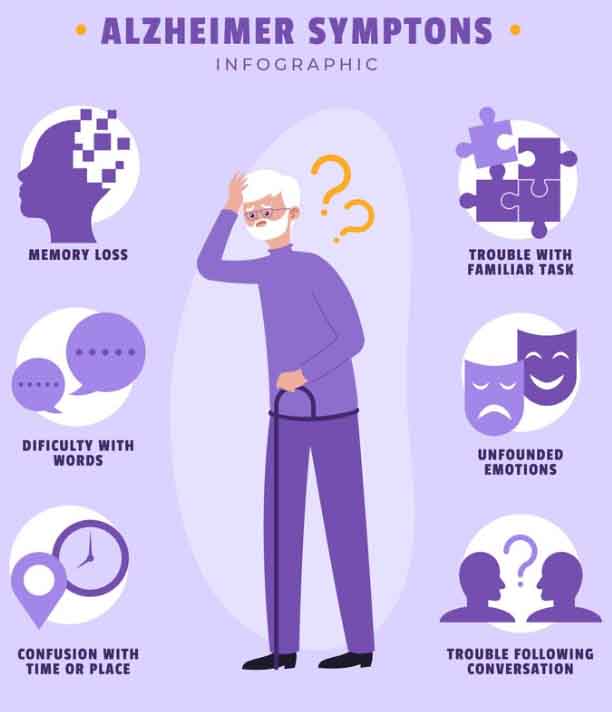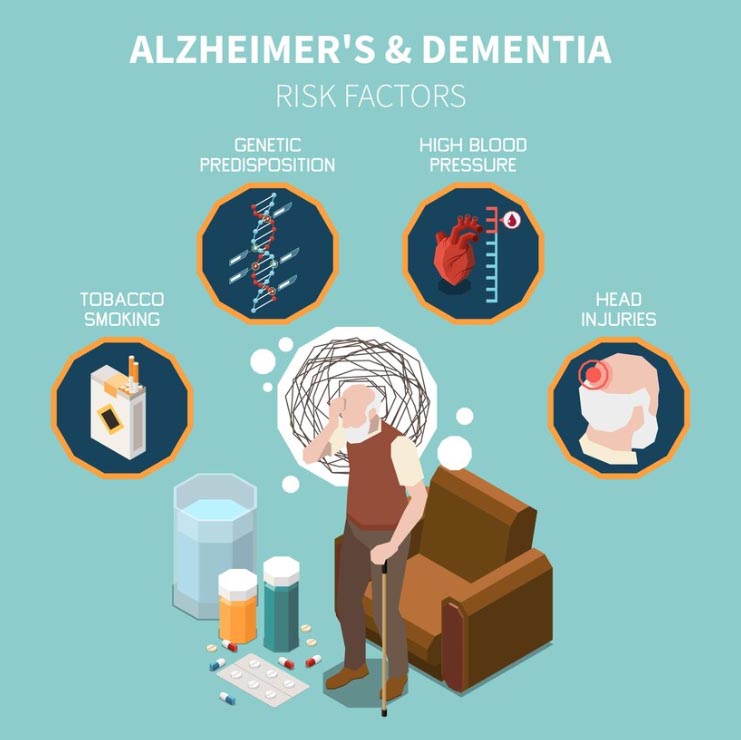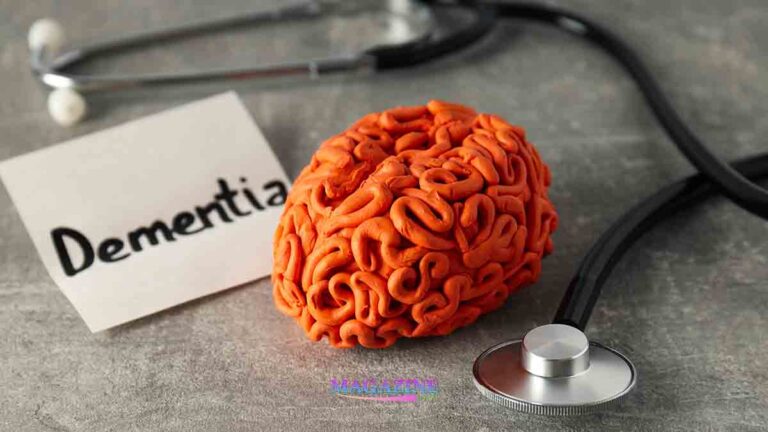Dementia Meaning
Dementia is a general term for a group of symptoms that affect memory, thinking, and social abilities. These symptoms are severe enough to interfere with daily life. It’s not a single disease, but rather an umbrella term encompassing various conditions that damage brain cells and disrupt brain function.
Table of Contents
Dementia Causes

Dementia is a broad term encompassing various conditions that affect brain function and cause a decline in cognitive abilities. These diverse conditions have individual causes, impacting different parts of the brain and leading to varied symptom profiles. Here’s a breakdown of some common dementia causes:
Alzheimer’s Disease:
- The most prevalent form of dementia, affecting over two-thirds of cases.
- Caused by abnormal buildup of protein plaques (amyloid beta) and tau tangles within brain cells.
- These accumulate gradually, disrupting communication between brain cells and ultimately leading to cell death.
Vascular Dementia:
- The second most common type, often caused by impaired blood flow to the brain.
- Can result from strokes, high blood pressure, and atherosclerosis.
- Disrupted blood flow deprives brain cells of oxygen and nutrients, leading to damage and cognitive decline.
Lewy Body Dementia:
- Characterized by abnormal buildup of Lewy bodies, protein deposits in brain cells.
- Shares symptoms with both Alzheimer’s and Parkinson’s disease, including memory loss, tremors, and hallucinations.
- The Lewy bodies disrupt brain chemicals like dopamine, affecting cognitive and motor functions.
Frontotemporal Dementia:
- Affects primarily the frontal and temporal lobes of the brain, responsible for personality, behavior, and language.
- Caused by buildup of different protein types depending on the subtype (frontotemporal lobar degeneration).
- Can lead to changes in personality, language difficulties, and impaired social skills.
Other Causes:
- Less common causes include Huntington’s disease, Creutzfeldt-Jakob disease, and normal pressure hydrocephalus.
- These conditions have diverse causes, such as genetic mutations, prion infections, and fluid buildup in the brain, respectively.
Additional Factors:
- Age is a significant risk factor for dementia, with prevalence increasing exponentially after 65.
- Family history of dementia can also increase the risk due to genetic susceptibility.
- Certain lifestyle factors like high blood pressure, diabetes, and head injuries may further contribute to the risk.
Remember, individual presentations of dementia can vary depending on the underlying cause and affected brain regions. Early diagnosis and proper management are crucial for improving quality of life and slowing disease progression.
See More : Stiff Person Syndrome: Symptoms & Care Tips for 2023
What causes Heart Attacks in Young People : Improving Heart Health in Men Over 50
Dementia Symptoms

Dementia symptoms can be diverse and vary depending on the underlying cause and affected brain regions. However, some common symptoms generally present across different types of dementia, although their severity and progression can differ. Here’s a breakdown of key symptom categories:
Memory Loss:
- This is often the first and most noticeable symptom, but its severity can vary.
- Forgetting recent events, names, and familiar places are common early signs.
- Difficulty remembering past experiences, appointments, and important information can become more pronounced as the disease progresses.
- Struggles with everyday tasks like managing finances, cooking, or following recipes can also develop.
Thinking and Reasoning Problems:
- Difficulty problem-solving, making decisions, and planning ahead can arise.
- Challenges with following instructions, understanding complex concepts, and completing multi-step tasks may become evident.
- Poor judgment and reduced ability to adapt to new situations can also become noticeable.
Changes in Behavior and Personality:
- Mood swings, irritability, and depression can occur.
- Apathy, loss of interest in previously enjoyed activities, and social withdrawal are common symptoms.
- Confusion, disorientation, and difficulty recognizing familiar faces or places may develop.
- Changes in sleep patterns, increased anxiety, and even paranoia can sometimes occur.
Physical Symptoms:
- Some types of dementia can also manifest physical changes, though these are less common.
- Tremors, balance problems, difficulty speaking, and swallowing difficulties may occur in certain cases.
- Increased clumsiness, falling, and changes in walking gait can sometimes be observed.
It’s important to note that not everyone with dementia will experience all these symptoms, and their severity and progression can vary significantly. Early detection is crucial for proper diagnosis and initiating appropriate management strategies to slow disease progression and improve quality of life.
Dementia Stages

While dementia manifests differently in each individual, it often progresses through various stages with increasing severity of symptoms. Although different frameworks exist, the most common way to conceptualize dementia stages is through a three-stage model:
1. Early (Mild) Stage:
- Symptoms are often subtle and may go unnoticed at first.
- Memory lapses might occur primarily with recent events or details.
- Difficulty with problem-solving and complex tasks might emerge.
- Changes in mood and personality may be subtle, like occasional irritability or apathy.
- Daily life remains largely independent, though minor adjustments might be necessary.
2. Moderate Stage:
- Symptoms become more noticeable and interfere with daily life.
- Memory loss worsens, affecting both recent and more distant events.
- Confusion and disorientation are more frequent, including difficulty with time and place.
- Difficulty reasoning, making decisions, and planning ahead becomes evident.
- Struggles with daily tasks like cooking, cleaning, and managing finances increase.
- Personality changes become more pronounced, possibly including anxiety, depression, or agitation.
3. Late (Severe) Stage:
- Severe decline in cognitive abilities and dependence on others for care.
- Significant memory loss, often with limited recall of personal details and history.
- Difficulty communicating and understanding spoken language.
- Physical coordination and mobility decline, increasing risk of falls and injuries.
- Personality and behavioral changes become more pronounced, requiring constant supervision.
Important Points to Remember:
- The transition between stages can be gradual and vary in pace for each individual.
- Specific symptoms and their severity can differ depending on the underlying dementia cause.
- Early diagnosis and intervention are crucial to maximize quality of life and potentially slow disease progression.
- Support and care for both the person with dementia and their loved ones are essential throughout the journey.
Types of Dementia
There are over 100 different types of dementia, each with its own unique characteristics and causes. However, some of the most common and significant types include:
1. Alzheimer’s Disease:
- The most prevalent type, accounting for over 60% of dementia cases.
- Caused by the buildup of amyloid plaques and tau tangles in the brain, disrupting communication between brain cells.
- Symptoms primarily involve memory loss, difficulty with thinking and reasoning, and changes in personality and behavior.
2. Vascular Dementia:
- The second most common type, caused by impaired blood flow to the brain.
- Can result from strokes, high blood pressure, and atherosclerosis.
- Symptoms often involve problems with thinking and reasoning, followed by memory loss and other cognitive decline.
3. Lewy Body Dementia:
- Characterized by abnormal deposits of Lewy bodies in the brain, similar to those in Parkinson’s disease.
- Symptoms include memory loss, hallucinations, tremors, and difficulty with movement and coordination.
4. Frontotemporal Dementia:
- Affects primarily the frontal and temporal lobes of the brain, responsible for personality, behavior, and language.
- Various subtypes exist, with symptoms ranging from personality changes and social difficulties to language problems and difficulties with planning and organizing.
5. Mixed Dementia:
- An increasingly recognized concept, involving features of multiple dementia types occurring simultaneously.
- Can involve combined elements of Alzheimer’s, vascular, and other types, leading to complex and varied symptom profiles.
Additional Dementia Types:
- Huntington’s disease
- Creutzfeldt-Jakob disease
- Normal pressure hydrocephalus
Other factors to consider:
- Age is a significant risk factor for dementia, with prevalence increasing significantly after 65.
- Family history can also play a role due to genetic susceptibility.
- Certain lifestyle factors like high blood pressure, diabetes, and head injuries may further increase the risk.
Remember:
- Early diagnosis and proper management are crucial for slowing disease progression and improving quality of life.
- Different types of dementia have varying symptoms and progression patterns.
- Seeking medical advice and accessing resources for support and care are essential for both the person with dementia and their loved ones.
How to prevent Dementia
While there is no guaranteed way to prevent dementia, research suggests that adopting healthy lifestyle habits can significantly reduce your risk and improve your overall brain health. Here are some key strategies:
Brain-Boosting Activities:
- Stay mentally active: Engage in stimulating activities like puzzles, reading, learning new skills, and playing games. This keeps your brain sharp and flexible.
- Socialize: Connect with friends and family, participate in social activities, and avoid isolation. Social interaction stimulates the brain and provides emotional support.
- Regular exercise: Physical activity promotes blood flow to the brain, boosts brain cell production, and reduces inflammation. Aim for at least 150 minutes of moderate-intensity exercise per week.
- Learn a new language: Studies show that learning a new language can improve cognitive function and delay the onset of dementia.
Healthy Diet and Habits:
- Eat a Mediterranean diet: Focus on fruits, vegetables, whole grains, legumes, fish, and healthy fats. This diet provides essential nutrients and antioxidants that protect brain health.
- Manage your blood pressure and cholesterol: High blood pressure and cholesterol are risk factors for dementia. Regular monitoring and controlling these levels can contribute to brain health.
- Maintain a healthy weight: Obesity is associated with an increased risk of dementia. A balanced diet and regular exercise help maintain a healthy weight.
- Don’t smoke and limit alcohol: Smoking and excessive alcohol consumption damage brain cells and increase the risk of dementia. Quitting smoking and moderating alcohol intake are crucial for brain health.
- Get enough sleep: Adequate sleep is essential for brain function and memory consolidation. Aim for 7-8 hours of quality sleep each night.
Additional Tips:
- Manage stress: Chronic stress can damage brain cells. Practice stress-reduction techniques like meditation, yoga, or deep breathing.
- Challenge yourself mentally: Step outside your comfort zone and take on new challenges to keep your brain stimulated and adaptable.
- See your doctor regularly: Regular checkups can help identify and manage health conditions that increase dementia risk.
Remember:
- While these strategies can reduce your risk, they do not guarantee complete prevention.
- Early diagnosis and proper management are crucial for slowing disease progression and improving quality of life.
- If you have concerns about your risk for dementia, consult your doctor for personalized advice and risk assessment.
What are the 5 signs of dementia?
While there isn’t a definitive “top 5” list for dementia signs, as symptoms can vary depending on the type and individual, here are 5 prominent early warning signs that often raise concern:
1. Memory Loss: This is often the first and most noticeable symptom, particularly forgetting recent events, names, or familiar places. Difficulty remembering past experiences, appointments, and important information can become more evident as the disease progresses.
2. Difficulty with Thinking and Reasoning: Problems solving problems, making decisions, and planning ahead can arise. Challenges with following instructions, understanding complex concepts, and completing multi-step tasks may become evident. Poor judgment and reduced ability to adapt to new situations can also be observed.
3. Changes in Behavior and Personality: Mood swings, irritability, and depression can occur. Apathy, loss of interest in previously enjoyed activities, and social withdrawal are common symptoms. Confusion, disorientation, and difficulty recognizing familiar faces or places may develop. Changes in sleep patterns, increased anxiety, and even paranoia can sometimes occur.
4. Language Difficulties: Difficulties finding the right words, expressing thoughts clearly, and understanding spoken language can emerge. Word repetition, forgetting names of everyday objects, and struggling to follow conversations may become noticeable. This can also manifest as writing difficulties or changes in handwriting.
5. Impaired Coordination and Spatial Awareness: Some types of dementia, particularly vascular dementia, can lead to issues with balance, coordination, and movement. Clumsiness, frequent falls, and difficulty with tasks like navigating stairs or driving can be early signs.
It’s important to note that not everyone will experience all these symptoms, and their severity and progression can vary. Early detection and seeking professional medical advice are crucial for proper diagnosis and managing potential underlying causes.
Dementia vs Alzheimer

While both dementia and Alzheimer’s disease affect memory and cognition, they are not the same:
Dementia:
- General term: Describes a group of symptoms that impact memory, thinking, and social abilities. It’s not a specific disease, but rather an umbrella term encompassing various brain disorders.
- Multiple causes: Different conditions can cause dementia, including Alzheimer’s disease, vascular dementia, Lewy body dementia, and frontotemporal dementia. Each has its own underlying cause and affects different parts of the brain.
- Varied symptoms: Presentation varies depending on the underlying cause, but common symptoms include memory loss, difficulty reasoning, changes in personality and behavior, and language difficulties.
Alzheimer’s Disease:
- Specific disease: The most common type of dementia, accounting for about 60-80% of cases. It is a progressive neurodegenerative disease that primarily affects the brain’s memory centers.
- Specific cause: Caused by the buildup of amyloid plaques and tau tangles in the brain, disrupting communication between brain cells.
- Gradual progression: Symptoms typically begin subtly and worsen gradually over time, affecting memory first, followed by other cognitive abilities.
Here’s a table summarizing the key differences:
| Feature | Dementia | Alzheimer’s Disease |
|---|---|---|
| Term type | General | Specific disease |
| Prevalence | Umbrella term for various conditions | Most common type of dementia |
| Causes | Multiple brain disorders | Buildup of amyloid plaques and tau tangles |
| Symptoms | Varied depending on the cause | Primarily memory loss, followed by other cognitive deficits |
| Progression | Gradual decline with varying pace | Gradual worsening over time, starting with memory |
In essence:
- Think of dementia as a library. Inside, there are many different books (types of dementia) with different authors (causes) and stories (symptoms).
- Alzheimer’s disease is just one of those books, a very common one, but not the only one.
Here are some additional resources that you may find helpful:
- Alzheimer’s Association: https://www.alz.org/
- National Institute on Aging: https://www.nia.nih.gov/health/alzheimers-and-dementia
- World Health Organization: https://www.who.int/health-topics/dementia



